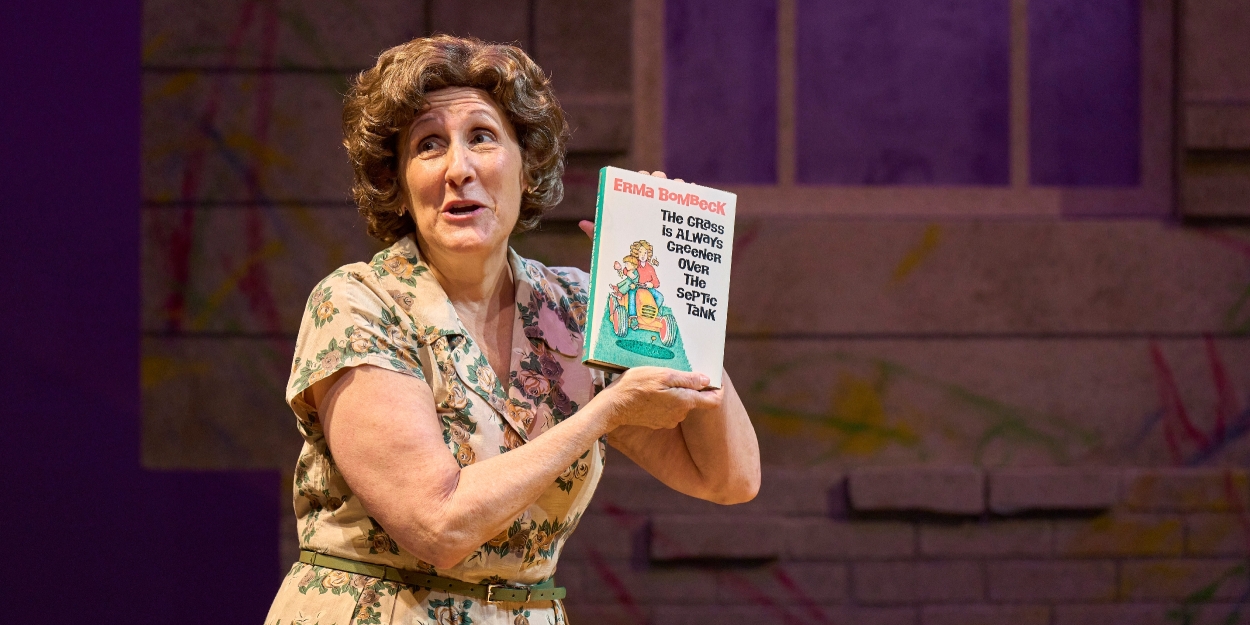Review: Erma Bombeck: At Wit's End is Filled with Lost Opportunities at DCPA
If Life is a Bowl of Cherries, Why am I in the Pits?

The Silent Generation, born between 1928 and 1945, grew up during times of economic hardship and war, leading to a reputation for resilience, loyalty, and a preference for stability over revolution. They were shaped by events like the Great Depression and World War II, and many became hardworking, civic-minded adults. My grandparents belonged to this generation and from my own perception, women endured more hardships and showed more resilience. Surpisingly, given the time, a prominent voice of the generation who gave birth to the baby boomers was none other than humorist Erma Bombeck. Although my own familiarity with Bombeck is fresh, I quickly recognized the direct influence she would have had on my grandparents. In Suburban Outlaw's production of Erma Bombeck: At Wit's End - part of DCPA's cabaret series at the Garner Galleria Theatre - Bombeck's rise to prominence is on full display.
Directed by Mark Cuddy, Erma Bombeck: At Wit's End offers a chronological timeline of major moments in the life of Bombeck, primarily those throughout her years of motherhood. We watch as she guides the audience along her rise from small-time writer to a nationally syndicated humorist and author. Written by sisters Allison and Margaret Engel, the play is a tribute to Bombeck's witty observations about suburban life, motherhood, and her role as an advocate for women's rights, particularly her support of the Equal Rights Amendment (ERA).
The play is structured around Erma reflecting on her journey from housewife and mother to a nationally syndicated columnist whose humorous take on everyday life resonated with millions. It showcases her signature wit as she navigates the challenges of raising a family, dealing with societal expectations, and maintaining a career. The play highlights Bombeck's desire to find humor in the mundane and break the stereotype of the "Happy Housewife".
Generally speaking, I enjoy the concept of the show. Though, I do think there is a lot of unrealized potential both in the writing and in the performance. In my deep dive of Edna Bombeck after seeing the play, there were a few constants. Among them, a distinct, short hairstyle reminiscent of Blanche Devereuax. Even Bombeck's wardrobe in simple internet searches result in images of a woman with a rather modern sense of fashion for the time. The wig and wardrobe design fastened upon Pam Sherman's Bombeck played into the more traditional trends of the era, but not of Bombeck herself. The scenic design worked well enough. I think the only thing that bothered me were the unfinished stage doors, but overall I felt the nostalgia of my own grandparent's home from my adolsecence.
The sole role of the show feels well written for a stand up comedian. Thus, it requires an actor who can deliver continues monologues in a way that seems natural and conversational. Pam Sherman's Bombeck felt entirely too rehearsed. It came across more as a speech with certain beats feeling like she was "holding for applause/laughter". Sherman's protrayal did not offer enough natural comedy, especially for a character based off of a humorist.
Overall, Edna Bombeck: At Wit's End misses an opportunitiy to tell a compelling story and elevate the voice of someone who spoke so loudly in their actual life. Her death and lifelong diseases that would have certainly been prominent in her life were underutilized. This specific example would have helped humanize a celebrity figure with things that affect so many people. I also think about Bombeck's connection to the ERA and the chance to introduce another prominent female figure in that fight, Phyllis Schlafly, who was incredibly engaged in the fight against the ERA. Although I do not believe they ever met in life, Bombeck would have certainly had opinions about the person who was her antithesis in the fight to ratify the ERA, especially consideirng Schlafly won that battle - especially considering the ERA, still, has not been ratified in the year of our lord, 2024.
Erma Bombeck: At Wit's End runs at the Garner Galleria Theatre through September 22, 2024.
Reader Reviews
Videos

